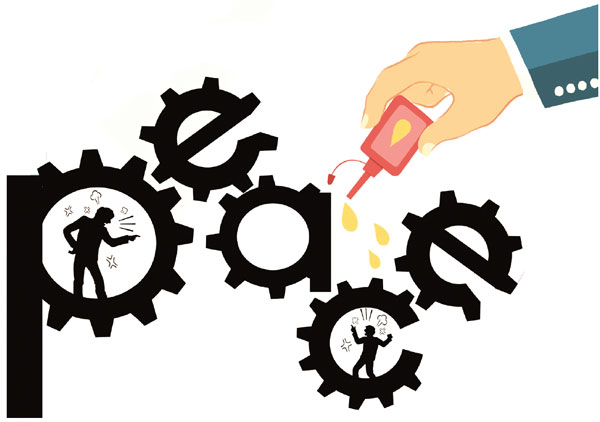How to be a peacemaker

From misunderstandings to couples' quarrels, how to help restore harmony to any situation
Chinese culture places a premium on the concept of "peace." Throughout history, the refrain that "peace is most precious" (以和为贵yǐ hé wéi guì) has prevailed. For family affairs, we have the phrase 家和万事兴 (jiā hé wànshì xīng, a peaceful family leads to the success of all things); for business, it's said that 和气生财 (héqi shēng cái, amiability breeds riches).
However, where there are humans, there are conflicts. Even the happiest couple, closest friends or most faithful partners will quarrel with each other at some point. At this time, a peacemaker might be necessary. But it's not an easy role to play. Before you throw yourself into the middle of the battlefield, make sure you're well prepared with the following phrases.

Many conflicts actually result from misunderstandings. A Chinese idiom says that "a bystander is always clear-minded" (旁观者清páng guān zhě qīng). As a third party who can see both sides' points of view, peace makers can try to fix the problem by explaining the situation. Inmost cases, they don't need to focus on what has already happened; instead, they emphasize intentions.
He has a sharp tongue but a soft heart like tofu. Don't take his words seriously.
Tā zhège rén dāo zǐ zuǐ dòufǔ xīn, shuōde huà nǐ bié wǎng xīnli qù.
他这个人刀子嘴豆腐心, 说的话你别往心里去.
Although he screwed it up, he meant well. I can guarantee he didn't do that on purpose.
Tā zhè yě shì hǎo xīn bàn huàishì.Wǒ gǎn dǎ bǎopiào tā bù shi gùyì de.
他这也是好心办坏事, 我敢打保票他不是故意的.
What he said was obviously spoken in anger. Actually, he doesn't mean that at all.
Tā shuōdemíngxiǎn dōushì qìhuà, shíjì shàng bìng bùshì nà ge yìsi.
他说的明显都是气话, 实际上并不是那个意思.
But defending one side in a dispute can be tricky. Sometimes you will make one person feel that you stand with the other, and thus you become "the enemy" as well - the peace maker inadvertently ends up becoming a troublemaker. This is particularly risky when it comes to family affairs or romantic relationships, which are usually too private for an outsider to intervene in. In such a situation, a peace maker should avoid deciding who is right and who is wrong. Instead, their task is to downplay the conflict so it ends naturally. In these cases, some old sayings can help.
First, make it clear that you are completely impartial:

This is just a case of "everyone has their own way of saying things." Neither of you is wrong.
Zhè jiàn shì zhēnshì"Gōng shuō gōng yǒulǐ, pó shuō pó yǒu lǐ", Nǐmen liǎ dōuméi cuò.
这件事真是 "公说公有理, 婆说婆有理", 你们俩都没错.
Then make them feel that it's no big deal to have a fight:
Even your tongue sometimes fights with your teeth. Is there any couple which doesn't quarrel?
Shétóu hé yáchǐ hái dǎ jià ne, guò rì zi nǎ yǒu bù chǎo jià de?
舌头和牙齿还打架呢, 过日子哪有不吵架的?
After the both sides cool down, urge them to patch it up right then, so things don't turn into a "cold war" later, in which nobody talks to the other side and resentment festers:
How can there be resentment between family members for more than one night? Why not make it up now?
Yī jiā rén nǎ yǒu gé yè chóu? Kuài hé hǎo ba.
一家人哪有隔夜仇? 快和好吧.
Of course, not everything can be skated over so easily. In many cases, a fight is a fight; there's no misunderstanding, no room for compromise, and the interested parties won't let go easily. Then, what can you do? Perhaps create a distraction. After all, there is always something more important, which provides a reason for people to put down their personal emotions. This strategy is especially useful in the workplace.
We should give priority to overall interests.
Wǒmen yīng gāi yǐ dà jú wéi zhòng.
我们应该以大局为重.
After successfully distracting the antagonists, seize the opportunity afterward to call a truce. If possible, make them promise to never look back on this unhappy event again.
This matter ends here. No one is allowed to mention it again.
Zhè jiàn shì dào cǐ wéi zhǐ, yǐ hòu, shuí dōu bù xǔ zài tí
这件事到此为止, 以后谁都不许再提.
Of course, it's not your job to make the peace between others. As the saying goes解铃还须系铃人(jiě líng hái xū xì líng rén, colloquially "he who ties the bell on the tiger must be the one to untie it"), suggesting that whoever started the problem should solve it.
If you've done your best, feel free to flee the premes with this all-purpose exit line:
You guys should calm down for a bit. We can talk about the rest some other day.
Nǐmen xiān lěng jìng yī xià, shèng xià de wǒmen gǎitiān zài tán.
你们先冷静一下, 剩下的我们改天再谈.
Courtesy of The World of Chinese, www.theworldofchinese.com
(China Daily Africa Weekly 05/26/2017 page23)
Today's Top News
- Opening of new gateway can help foster global economic and trade cooperation
- The farmer, the snake and Japan's memory hole
- Crossing a milestone in the journey called Sinology
- China-Russia media forum held in Beijing
- Where mobility will drive China and the West
- HK community strongly supports Lai's conviction






























